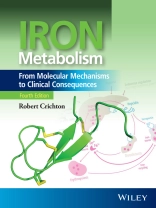Iron is indispensable for the growth, development and well-being of almost all living organisms. Biological systems from bacteria, fungi and plants to humans have evolved systems for the uptake, utilisation, storage and homeostasis of iron. Its importance for microbial growth makes its uptake systems a natural target for pathogenic microorganisms and parasites. Uniquely, humans suffer from both iron deficiency and iron overload, while the capacity of iron to generate highly reactive free radicals, causing oxidative stress, is associated with a wide range of human pathologies, including many neurodegenerative diseases. Whereas some essential metal ions like copper and zinc are closely linked with iron metabolism, toxic metals like aluminium and cadmium can interfere with iron metabolism. Finally, iron metabolism and homeostasis are key targets for the development of new drugs for human health.
The 4th edition of Iron Metabolism is written in a lively style by one of the leaders in the field, presented in colour and covers the latest discoveries in this exciting area. It will be essential reading for researchers and students in biochemistry, molecular biology, microbiology, cell biology, nutrition and medical sciences. Other interested groups include biological inorganic chemists with an interest in iron metabolism, health professionals with an interest in diseases of iron metabolism, or of diseases in which iron uptake systems are involved (eg. microbial and fungal infections, cancer, neurodegenerative disorders), and researchers in the pharmaceutical industry interested in developing novel drugs targeting iron metabolism/homeostasis.
Giới thiệu về tác giả
Professor Robert Crichton, Department of Biochemistry, Université Catholique de Louvain, Belgium
Professor Crichton has worked on cytochrome c in Glasgow, insect haemoglobins in Munich, ferritins and transferrins in Glasgow and Berlin, and on all these areas plus new developments in the understanding of iron-protein interactions in Louvain-la-Neuve. He is the author of Metal-Based Neurodegeneration.












